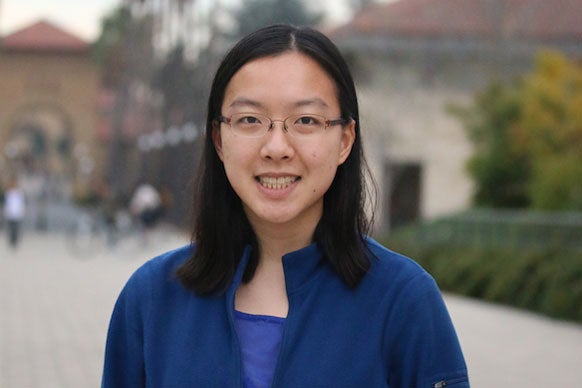Stanford senior Vivian Wang, an electrical engineering major, has been awarded a Churchill Scholarship, which provides funding to American students for one year of master’s study in science, mathematics and engineering at the University of Cambridge in England.

Electrical engineering senior Vivian Wang plans to pursue a master’s degree in physics as a Churchill Scholar at Churchill College, University of Cambridge. (Image credit: Courtesy Vivian Wang)
Wang, who is minoring in mathematics, is one of 15 students awarded scholarships by the Winston Churchill Foundation of the United States. The scholarships were established at the request of Sir Winston Churchill (1874-1965), a British statesman and former prime minister, to fulfill his vision of scientific exchange between the United States and the United Kingdom. The goal of the scholarships is to advance science and technology on both sides of the Atlantic, helping to ensure prosperity and security.
As a Churchill Scholar, Wang, 21, plans to pursue a master’s degree in physics at Churchill College, which is part of the University of Cambridge. She said the scholarship gives her the opportunity to pursue research in a new field.
“I am grateful for the research and other experiences Stanford has provided me thus far and look forward to the scientific and cultural opportunities provided through the Churchill Scholarship,” Wang said.
New device
Wang hopes to develop a device for measuring protein levels using nanopore sensing. She described her proposal in her scholarship application:
“Rapid detection of diseases and real-time monitoring of the health state of humans are key goals for personalized medicine. Current devices like heart-rate monitors in smartwatches provide essential, but limited, health information. Proteins found in blood or other bodily fluids are commonly used as disease markers in the clinic, yet easy-to-use, readily available measurement approaches for quantifying protein levels are still lacking. I propose to develop a new measurement approach that enables a handheld system for multiplexed protein biomarker monitoring.”
At Stanford, Wang has worked as an undergraduate research assistant for Amin Arbabian, an assistant professor in electrical engineering. She did research on a co-optimized system design for high signal-to-noise ratio in microfluidic impedance cytometer devices.
During the summer of 2014, Wang took part in the Electrical Engineering Department’s Research Experience for Undergraduates, which is designed to give students an opportunity to work with members of the faculty and their research groups on advanced research topics. Wang worked with James Harris, professor of electrical engineering, investigating a new dry-wet digital etch technique for GeSn alloys. Later, she finalized the results and co-authored “Dry-Wet Digital Etching of Ge1-xSnx” in Applied Physics Letters.
Wang has also worked as a teaching assistant for An Intro to Making: What is EE and Digital System Design. She is a peer tutor in math and physics – selected in a competitive process by the Office of the Vice Provost for Teaching and Learning – and provides weekly drop-in tutoring.
Mathematical artwork
Wang’s artwork – colorful beaded polyhedral pieces – were selected in 2015 and 2016 for the juried mathematical arts exhibition of the Bridges Conference, the world’s largest interdisciplinary conference on mathematical connections in art, music, architecture, education and culture. Regarding the artwork, she wrote:
“As both a math-lover and artist, I am curious about geometry, color and symmetry. I enjoy learning and playing around with different art forms and their applications to the realm of mathematical artwork. Most recently, I have been interested in designing and creating beaded polyhedral pieces, due to the versatility of the technique in forming various three-dimensional geometric structures and the puzzle-like challenge of constructing such pieces.”
She is a former co-director of Stanford Splash, which brings middle school and high school students to campus for a two-day learning extravaganza of classes taught by Stanford students. Wang also taught Splash classes, most recently modular origami, which involves folding many small units and assembling them into larger 3-D geometric structures without glue or tape.
Stanford students interested in overseas scholarships and Stanford faculty interested in nominating students for such awards should contact Diane Murk, manager of the Overseas Resource Center, at dmurk@stanford.edu, or John Pearson, director emeritus of the Bechtel International Center, at john.pearson@stanford.edu.